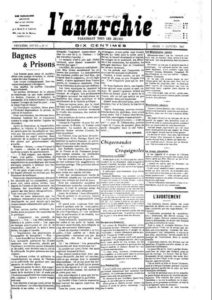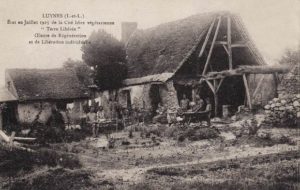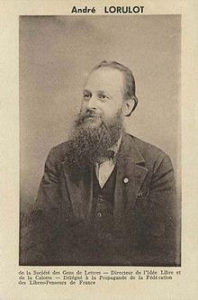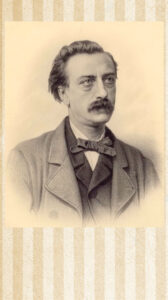De Bananeneter van Romainville ~ Veganisme in een anarchistische kolonie
In het begin van de vorige eeuw ontstonden in Frankrijk de eerste anarchistische leefgemeenschappen, ook kolonies genoemd, die vaak ook het veganisme propageerden en in praktijk brachten. De kolonie in het dorpje Romainville bij Parijs was in de jaren tien een van de vele kolonies in Frankrijk. Het leven in de kolonies kon naar eigen wil en keuze worden ingevuld, al zal niet overal geëxperimenteerd zijn de vergaande vormen van veganisme zoals in Romainville.
Initiatiefnemer was de fanatieke veganist André Lorulot (1885-1963), rond 1910 redacteur van het tijdschrift l’anarchie. Niet alle bewoners van de leefgemeenschap deelden zijn enthousiasme voor de extreme vorm van veganisme die hij propageerde en die hij als wetenschappelijk beschouwde.
Vegetarisme bestaat al sinds de oudheid. Pas in de negentiende eeuw ontstond met name in Frankrijk een beweging die het veganisme propageerde – ook al kwam de term pas later in gebruik – en in het begin van de vorige eeuw ontstonden een aantal veganistische leefgemeenschappen. De bewoners waren voor het merendeel afkomstig uit het anarchistische milieu. Voor de Eerste Wereldoorlog telde Frankrijk zo’n tiental van deze leefgemeenschappen, verspreid over het land, die voor korte of langere tijd hebben bestaan. In die jaren, waarin veel plattelandsbewoners naar de steden trokken, moet het niet moeilijk geweest zijn ergens een leegstaand buurtschap of enkele lege boerderijen te vinden. Het aantal bewoners per kolonie bedroeg meestal enige tientallen.
Veganisme in Frankrijk
De eerste anarchistische kolonie in Frankrijk was gevestigd bij het dorpje Vaux (dep. Aisne), tussen 1903 en 1909. In 1911 ontstond in Bascon, een dorp in de buurt, een naturistische, veganistische kolonie. Stichter van deze communes was Louis Rimbault (1877-1949). De belangrijkste propagandist van deze kolonie was Jean Labat (1892-1932), vanwege zijn lange haar en baard plaatselijk bekend als Jezus Christus. Hij maakte foto’s van de kolonie en haar bewoners, die hij als ansichtkaarten verkocht.
Een andere belangrijke propagandist van het veganisme was George Butaud (1868-1926), die in 1923 in de kolonie in Bascon ging wonen. Daarnaast begon hij in Parijs een veganistisch restaurant, het Foyer Végétalien (40 Rue Mathis), waar ook een slaapzaaltje en een bibliotheek waren gevestigd en waar cursussen Esperanto, scheikunde, natuurkunde en Frans werden gegeven. Samen met Rimbault en de anarchiste Sophie Zaïkowska (1880-1939) stichtte Butaud in 1923 bij Luynes in het departement Indre-et-Loire, een zelfvoorzienend veganistisch dorp: Terre Libérée. Ongeveer twintig mensen woonden permanent in de kolonie, per jaar kwamen er tussen de twee- en driehonderd bezoekers, o.a. voor cursussen. Ondanks diverse interne ideologische conflicten en de oorlog, bleef de kolonie tot 1949 bestaan.
 Anarchistisch tijdschrift
Anarchistisch tijdschrift
In 1911 had Louis Rimbault het wel gezien met het communeleven in Bascon. Bij lokale arbeiders in de omgeving had hij weinig belangstelling ondervonden voor zijn opvattingen over anarchistisch federalisme. In Parijs vond hij een baantje in een garage en maakte hij kennis met een aantal anarchisten die betrokken waren bij het tijdschrift l’anarchie. De redactie daarvan was gevestigd in een pand in de Rue du Chevalier de la Barre, vlakbij de Sacré-Coeur, waar ook de drukpers stond en lezingen konden worden gehouden.
L’anarchie was in 1905 opgericht door de typograaf en actieve anarchist Albert Libertad (pseudoniem van Albert Joseph, 1875-1908), die in die tijd in Parijs populaire lezingen over het anarchisme hield. In l’anarchie – oplage zo’n vierduizend exemplaren – pleitte hij voor een individualistisch anarchisme en verzette hij zich tegen de bestaande maatschappijvorm, loonarbeid, huwelijk, dienstplicht, verkiezingen, roken, alcohol en het eten van vlees. Hij was tegenstander van het anarchosyndicalisme omdat deze strijdwijze slechts tot lotsverbetering van de arbeiders zou leiden, en aan de bestaande maatschappelijke ongelijkheid niets zou veranderen.
Illegalisme
De sinds zijn geboorte kreupele Libertad was door zijn agitatie en propaganda een voortdurende doorn in het oog van autoriteiten, politie en justitie. Op een avond werd hij door agenten zo hard in elkaar geschopt, dat hij aan de gevolgen ervan overleed. Het redacteurschap van l’anarchie ging over naar Maurice Vandamme (1886-1974), die al eerder bijdragen voor het blad had geschreven onder het pseudoniem Mauricius. Deze zette het redactionele beleid van Libertad voort, samen met zijn vriendin Rirette Maîtrejean (1887-1968). Zij schreef felle artikelen waarin zij de maatschappelijke positie van vrouwen
bekritiseerde en pleitte voor vrije liefde, iets wat zij ook in praktijk bracht. Een andere medewerker was de fanatieke alcoholbestrijder en veganist André Roulot, die schreef onder het pseudoniem André Lorulot. Mauricius en Lorulot waren pleitbezorgers van individuele en gemeenschappelijke, indien nodig gewelddadige verzetsdaden tegen de heersende maatschappelijke orde. Dit illegalisme, waarbij anarchisten ook inbraken en overvallen pleegden met het doel de maatschappelijke orde te ondermijnen, zorgde ook voor financiële armslag voor de anarchistische beweging. Read more
The INSANE Logic Of The YODEL
Video lecture on the wide & wild world of the YODEL based on the book YODEL IN HIFI. This film premiered in LONDON on 11 March 2014 at the Peckham Liberal Club as part of the Muckle Mouth series. Book YODEL IN HIFI: From Kitsch Folk to Contemporary Electronica. For info:http://uwpress.wisc.edu/
Break the voice and you enter the marrow of existence. The film documents the ubiquitous and unique presence of yodeling just about everywhere. From roots deep in the earth to soundings that probe deep space… And no genre is safe: opera, hiphop, rock, pop, folk, jazz, house, techno, reggae… FEATURES: Werner Herzog, Bernhard Betschart, Phil Minton, Myriam van Imschoot & Doreen Kutzke, Barbara Hannigan, Taylor Ware, Francelle Maria, Drag Queen Lady KinMee, Dominatrix Manuela Horn, a yodeling cat, Tarzan, Bob Marley, Aka Pygmies, Prison work songs, hollerin’, Jimmie Rodgers, SE Rogie, Mike Johnson, Kia Brekkan, Kishore Kumar, Cyrill Schläpfer, Erika Stucky, Christine Lauterburg, Alice Babs, Focus, Mental Theo & Charly Lownoise, Bobbejaan Schoepen, Honeymoon Killers, Harry Torrani, George Van Dusen, Brian Eno, Cranberries, Buzzcocks, People Like Us, Mysterious Asthmatic Avenger, Shelley Hirsch, Jacques Dutronc, Munich House Mafia, Franzl Lang, Fatima Miranda, Kristina Fuchs, Zabine, Meredith Monk, Neil Rolnick, Anna Kiefer, Paul Dutton, Mij, Tim Buckley, Slim Whitman, Mal Webb, Wandervogels, Chinese yodeling, tea-picking yodels, Korean, Japanese, Filipino, Basques, Cambodian, Taiwanese, Persian, Tuvan, Georgian…
This film uses original footage but mostly relies on found and archival footage. My hope & goal is to make a feature length documentary using high quality stock and more original footage. I am looking to partner with a producer and filmmaker with interest in the subject.
All sources & credits for found footage used in this film available upon request.
Yodel in HiFi: From Kitsch Folk to Contemporary Electronica :: http://uwpress.wisc.edu/books/4594.htm
YODEL-AY-EE-OOOO: The Secret History of Yodeling Around the World :: http://www.routledge.com/
Wreck This Mess Radio :: http://www.mixcloud.com/wreckthismess/
Youtube Channel: https://www.youtube.com/channel/
Bart Plantenga is a freelance researcher, writer, translator, and editor. He is the author of Yodel-Ay-Ee-Oooo: The Secret History of Yodeling around the World and the compiler of the CD Rough Guide to Yodel. He lives and works in Amsterdam and is the disc jockey of radio show Wreck This Mess.
Author’s website: bartplantenga.weebly.com/
Author’s blog: bartyodel2.wordpress.com
Multatuli online
Multatuli – pseudoniem van Eduard Douwes Dekker (1820-1887) – wordt beschouwd als de belangrijkste schrijver uit het Nederlands taalgebied. Zijn invloed op de Nederlandse literatuur, de koloniale politiek, het feminisme en de arbeidersbeweging is baanbrekend geweest. Het Multatuli Genootschap/Stichting Multatuli Huis wil de belangstelling voor deze schrijver en denker levend houden door op multatuli.online zijn volledige werk en correspondentie en alle documenten (zoals teksten, afbeeldingen, archivalia) die op hem betrekking hebben digitaal en in samenhang te publiceren. De website is bestemd voor belangstellenden en onderzoekers maar ook voor wie hier kennismaakt met Multatuli.
De realisering van dit project zal stapsgewijs plaatsvinden. Op dit moment zijn alle zelfstandige publicaties van Multatuli aanwezig, alle bewaard gebleven correspondentie (ca. 5000 brieven), een biografie (door Dik van der Meulen) en het complete voor deze website gedigitaliseerde Multatuli Archief (eigendom van het Multatuli Genootschap en bewaard door Allard Pierson, De Collecties van de Universiteit van Amsterdam).
Daarnaast bevat de website een Multatuli Encyclopedie, een Multatuli Atlas, een Multatuli Lexicon en toegang tot een ruime hoeveelheid secundaire literatuur. Waar mogelijk wordt gewezen naar eerder gedigitaliseerde werken en documentatie, zoals te vinden bij de Koninklijke Bibliotheek (de Digitale Bibliotheek voor de Nederlandse Letteren en Delpher) en het Huygens Instituut.
Het colofon vermeldt alle personen en instellingen die tot nu toe een bijdrage hebben geleverd. Om een zo compleet mogelijk beeld van Multatuli’s werk en levensloop tot stand te brengen kunnen we de hulp van kenners en geïnteresseerden gebruiken. Wie over documenten – brieven, beeldmateriaal of secundaire literatuur – beschikt die hier niet mogen ontbreken of wie anderszins een bijdrage wil leveren aan multatuli.online (financieel of in natura), wordt van harte uitgenodigd om zich te melden bij de redactie van de website. Ook onjuistheden of suggesties voor verbetering kunnen aan de redactie worden doorgegeven.
Deze website is een initiatief van het Multatuli Genootschap en de Stichting Multatuli Huis. Door (fiscaal vriendelijk) donateur te worden ondersteunt u het werk van het genootschap en de stichting en verzekert u de instandhouding van deze website.
Bovenaan iedere pagina van deze website worden delen van de Multatuli Collectie getoond – brieven, documenten, manuscripten, foto’s, afbeeldingen en meer – om een indruk te geven van de rijkdom en de verscheidenheid van die collectie.
Bezoek de site: https://multatuli.online/home
Does the UK Need the EU? An Interview With Malcolm Sawyer
What was Brexit all about? What will its most likely consequences for UK, EU, and the world economy at large? Renowned British economist Malcolm Sawyer, Emeritus Professor of Economics at Leeds University, UK, discusses these and other related issues in an exclusive interview below with C. J. Polychroniou.
C. J. Polychroniou:Brexit has happened. The UK has gotten a divorce from the European Union (EU), after being a member for 47 years. Is this a cultural and political revolution?
Malcolm Sawyer: As of 11pm. (UK time) on 31st January 2020, the UK is no longer a member of the EU, and as such does not participate in the political deliberations of the EU (e.g. no longer any UK members of the European Parliament, UK government ministers do not attend meetings of council of ministers). However, during what is termed a transition period, intended to be completed by 31st December this year, very little has changed in the economic and social relationships between the UK and the EU. Trade continues to take place on the same terms as before, the free movement of labour between countries continues, etc. etc.. The economic effects of UK’s leaving of the EU are yet to be felt, e.g. those from changes in the trading arrangements. To date, there have been effects of the prospects of Brexit: the sterling exchange rate declined sharply shortly after the referendum from which it has not yet fully recovered, and investment has been subdued through uncertainty of the future relationships.
The referendum result was 52/48 in favour of leave over remain, and opinion polls since the referendum have tended to find some, albeit small, movement in opinion towards remain. The general election result of December 2019 resulted in a large Parliamentary majority for the Conservative government with Boris Johnson as Prime Minister, but based on a 43 per cent share of the national vote. The main political parties against Brexit without a further referendum, and against what is often termed a ‘hard Brexit’ (which is now the probable outcome) secured 52 per cent of the national vote.
At the present time, very little has changed in the day-to-day relationships between the UK and the EU. Trade relationships, movement of peoples etc will be decided upon over the next few months. It remains to be seen how co-operative will be the future relationships between the UK and the EU – much of the Brexit campaign has been based on hostility and suspicion of the EU, which undermine future co-operation. Brexit and the campaigns surrounding it have shown up deep divisions within British society.
C. J. Polychroniou: What are the implications of Brexit for the future of Great Britain, the EU, and the world economy at large?
Malcolm Sawyer: Future of UK. The result of the referendum (2016 on remain or leave the EU) revealed significant differences between age groups (old more likely to vote leave than the young), and geographical (cities more likely to vote remain than towns and rural areas). There were also differences between the constituent nations of the UK – England and Wales both voted to leave, and Scotland and Northern Ireland to remain.
There are forces which could propel a break-up of the United Kingdom with Scotland becoming an independent nation and Northern Ireland re-unified with Ireland. The pressures for independence in Scotland are enhanced by the UK leaving the EU, with a Scottish National Party (SNP) in power in Scotland (albeit as a minority government) continuing to push for a second referendum on Scottish independence. A majority of members of the Scottish Parliament favour independence (SNP plus Scottish Green Party) and recent opinion polls put support for independence slightly in the lead.
James Baldwin Debates William F. Buckley (1965)
The legendary debate that laid down US political lines on race, justice and history
In 1965 at the University of Cambridge, two of the foremost American intellectuals were challenged with the question: ‘Has the American Dream been achieved at the expense of the American Negro?’ From William F Buckley’s highly stylised posturing and pointing, to James Baldwin’s melodious rhetorical flourishes and memorable scowls, what’s become known as the ‘Baldwin-Buckley Debate’ now stands as one of the archetypal articulations of the dividing line between US progressives and conservatives on questions of race, justice and history. Baldwin, the famed African-American writer, whose reputation as a progressive social critic and visionary Civil Rights activist has only risen in the intervening decades, argues that the very foundation of US society is built on the dehumanisation of its African-American population. Meanwhile, Buckley, the leading US conservative intellectual of the period, argues that African Americans would be best served by exploiting their country’s many freedoms and opportunities, rather than pointing a collective finger at discriminatory structures and institutions. In both cases, their positions presage contemporary divisive debates in the US, though one wonders whether such an event could happen in today’s political environment.
While usually reduced to short clips, the full hour-long debate – presented here in its entirety – is a remarkable historical document in its own right. Conducted in front of a large, almost entirely white and predominantly male audience at the Cambridge Union, the encounter offers a sense of campus intellectual life in the mid-1960s through the atmosphere in the room, the things that made people laugh, and the particular references made by the debaters. After the always eloquent Baldwin evokes his personal experience to describe a perpetually disorienting and demeaning existence for African Americans, Buckley responds with facts and figures – as well as an ad hominem shot at Baldwin’s speaking voice – to argue that there’s an American Dream available to all those who would pursue it. In the end, Baldwin prevailed, earning an ardent standing ovation and a landslide victory in the Union’s vote on the motion raised.
From: https://aeon.co/the-legendary-debate-that-laid-down-us-political-lines-on-race-justice-and-history
Noam Chomsky: Sanders Threatens The Establishment By Inspiring Popular Movements
The impeachment trial of Donald Trump for power abuses is winding down, with his acquittal all but ensured when the Senate reconvenes on Wednesday to vote on the articles of impeachment. Yet, his real crimes continue to receive scant attention, and it is Sen. Bernie Sanders who is regarded by the political establishment as the most dangerous politician because of his commitment to a just and equitable social order and a sustainable future. Meanwhile, the conclusion of the Davos meeting in January demonstrated the global elites’ ongoing commitment to unimpeded planetary destruction.
This is indeed the state of the contemporary U.S. political environment, as the great public intellectual Noam Chomsky points out in this exclusive interview for Truthout.
C.J. Polychroniou: The impeachment trial of Donald Trump isnearlyover, and what a farce it has been — something you had predicted from the start, which is also the reason why you thought that an impeachment inquiry was a rather foolish move on the part of the Democrats. With that in mind, what does this farcical episode tell us about the contemporary state of U.S. politics, and do you anticipate any political fallout in the 2020 election?
Noam Chomsky: It seemed clear from the outset that the impeachment effort could not be serious, and would end up being another gift by the Democrats to Trump, much as the Mueller affair was. Any doubts about its farcical nature were put to rest by its opening spectacle: Supreme Court Chief Justice John Roberts struggling to keep a straight face while swearing in senators who solemnly pledged that they would be unmoved by partisan concerns, and at once proceeded — as everyone know they would — to behave and vote along strictly party lines. Could there be a clearer exhibition of pure farce?
Are the crimes discussed a basis for impeachment? Seems so to me. Has Trump committed vastly more serious crimes? That is hardly debatable. What might be debatable is whether he is indeed the most dangerous criminal in human history (which happens to be my personal view). Hitler had been perhaps the leading candidate for this honor. His goal was to rid the German-run world of Jews, Roma, homosexuals and other“deviants,” along with tens of millions of Slav “Untermenschen.” But Hitler was not dedicated with fervor to destroying the prospects of organized human life on Earth in the not-distant future (along with millions of other species).
Trump is. And those who think he doesn’t know what he’s doing haven’t been looking closely.







